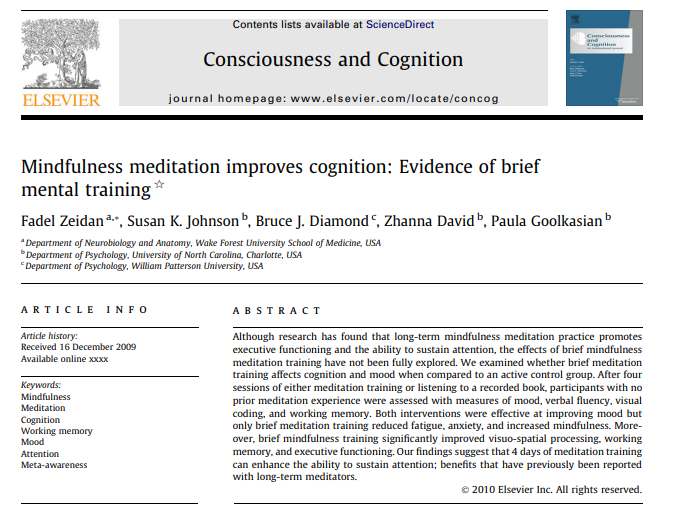Although research has found that long-term mindfulness meditation practice promotes executive functioning and the ability to sustain attention, the effects of brief mindfulness meditation training have not been fully explored. We examined whether brief meditation training affects cognition and mood when compared to an active control group. After four sessions of either meditation training or listening to a recorded book, participants with no prior meditation experience were assessed with measures of mood, verbal fluency, visual coding, and working memory. Both interventions were effective at improving mood but only brief meditation training reduced fatigue, anxiety, and increased mindfulness. Moreover, brief mindfulness training significantly improved visuo-spatial processing, working memory, and executive functioning. Our findings suggest that 4 days of meditation training
can enhance the ability to sustain attention; benefits that have previously been reported with long-term meditators.
Mindfulness meditation improves cognition: Evidence of brief mental training
Publication
Consciousness and Cognition
Abstract
Web and Email Links
Related Listings
Journal
Annals of the New York Academy of Sciences
A wakeful hypometabolic state accompanies the practice of a relaxational, meditation technique called Transcendental Meditation. The state is characterized by decreased oxygen consumption, carbon dioxide elimination, respiratory rate and minute ventilation, with no change in respiratory quotient. Arterial blood pH and base excess decrease slightly while arterial blood lactate markedly decreases. Systolic, diastolic, and mean arterial blood pressures remain unchanged. The electroenceph […]
Journal
PLOS ONE
Recently, much scientific attention has been focused on resting brain activity and its investigation through such methods as the analysis of functional connectivity during rest (the temporal correlation of brain activities in different regions). However, investigation of the magnitude of brain activity during rest has focused on the relative decrease of brain activity during a task, rather than on the absolute resting brain activity. It is thus necessary to investigate the association […]
Journal
Behavior Modification
Sleep latency changes following behavioral interventions for sleep-onset insomnia are only moderate because the majority of insomniacs do not achieve good sleeper status at posttreatment. This study evaluated the efficacy of a multifactor behavioral intervention consisting of stimulus control and relaxation-response training (n = 10) compared to stimulus control alone (n = 10) for sleep-onset insomnia. Only the multifactor subjects' mean posttest sleep latency fell within the good sle […]

